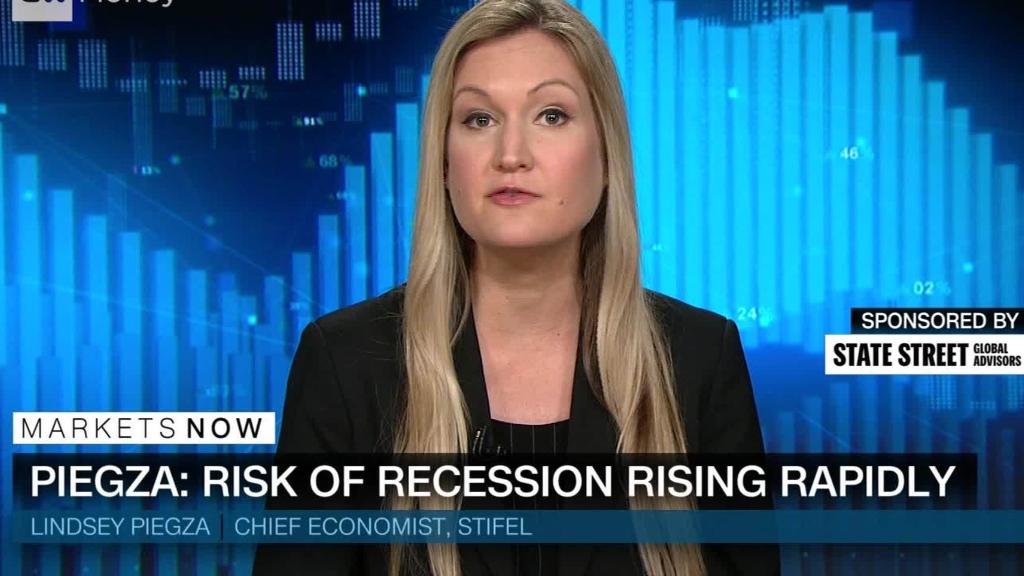
The bulls are once again stampeding into tech stocks. But not even bulls can run forever.
Wall Street, captivated by remarkable growth prospects in tech, has lifted the Nasdaq by 11% this year.
A third of the tech stocks in the S&P 500 have gained at least 20%. Favorites have been showered with even more love: Netflix (NFLX) has rocketed 90%, Twitter (TWTR) has soared 82%, and Amazon (AMZN) is up 45%. Not to mention Apple's (AAPL) 13% jump back to a record high.
But some analysts are warning that the market's fascination with these growth stocks could end, especially as the Federal Reserve gradually removes the easy-money punch bowl.
The "biggest risk is a quick, deep tech sell-off," Michel Hartnett, chief investment strategist at Bank of America Merrill Lynch, wrote to clients on Friday.
The worry is that investors who are piling into tech stocks now will sell at the same time during market turmoil. Or that a scare like the user-data controversy that erupted at Facebook (FB) will start an investor exodus from the industry.
"We remain defensive and happy to sell" into market rallies, Hartnett said.
Related: Ben Bernanke warns this is the Wile E. Coyote economy
Of course, tech stocks are booming for good reason: These companies are making gobs of money. And they're disrupting entire industries.
"Unlike the technology mania of the 1990s, most of this success can be explained by strong fundamentals," Goldman Sachs analysts wrote in a recent paper titled "Why Technology Is Not a Bubble."
Skeptics have wrongly called the end of the tech run before. The Nasdaq plunged 11% in just a few weeks this past winter before racing back to an all-time high.
Still, it's startling just how big some tech giants have become.
Amazon, Apple and Alphabet (GOOGL) have a combined market value of $2.5 trillion. That's enough to buy all 33 oil and gas companies in the S&P 500 energy sector — and still have $1 trillion left to scoop up JPMorgan Chase (JPM), Bank of America (BAC) and Wells Fargo (WFC).
Wall Street's love for tech stocks stands in stark contrast to the trouble in other corners of the market.
Slow-growing consumer staples stocks have tumbled 13% this year as they grapple with higher costs and shoppers' shifting tastes. Big names like General Mills (GIS), Campbell Soup (CPB) and Kraft Heinz (KHC) have fared much worse, plunging more than 20% apiece.
Some emerging markets have also gotten crushed, mostly by the stronger US dollar. Brazil's stock market has tumbled 16% this year, Argentina's has plunged 22%, and Turkey's is down more than a quarter.
And bitcoin is down by about half in 2018. The cryptocurrency shed another 7% on Monday following a cyberheist at an exchange.
"We have been experiencing 'pop-up' thunderstorms in what I would call the weakest links in the capital markets," Morgan Stanley chief US equity strategist Michael Wilson wrote in a note to clients.
Related: Execs are cashing in on the explosion in stock buybacks
Wilson predicted a "rolling bear market across asset classes, individual securities, sectors and regions."
The turbulence has come as the Fed, encouraged by the stronger economy, steadily raises interest rates and shrinks its massive balance sheet. The Fed is widely expected to raise rates on Wednesday and again later this year.
The European Central Bank is likewise signaling it may begin to slow efforts to stimulate the eurozone economy by purchasing bonds. That program, known as quantitative easing, or QE, has boosted stock prices around the world.
"QE security blanket for markets has vanished," Hartnett wrote.
Wilson said that low unemployment — the jobless rate matched a half-century low in May — will force the Fed to keep raising rates, even if markets wobble.
"It might take a larger financial accident to get the Fed to change direction or even pause than in the past," he said.
Investors are increasingly looking for safety in tech stocks. They poured about $2.3 billion into tech last week, the second most ever, according to Bank of America. The tech sector has enjoyed $140 billion of investment this year, on track for the biggest year on record, the firm said.
The thinking is that tech stocks, backed by strong results and bright outlooks, can grow in any environment. But Morgan Stanley's Wilson warned that growth stocks may not be safe once the next storm comes.
While it's "impossible to predict when the moment of truth will come," Wilson said "it could be at any moment, and without warning."


